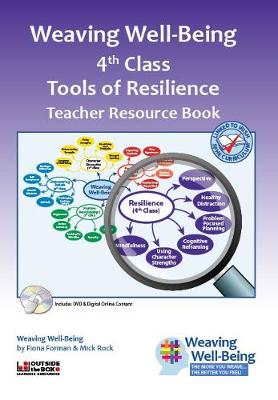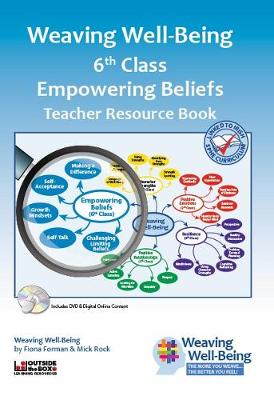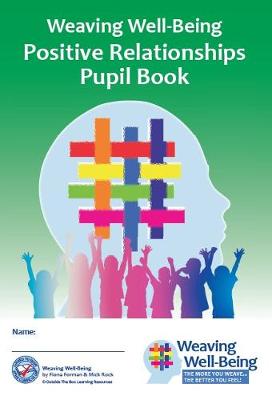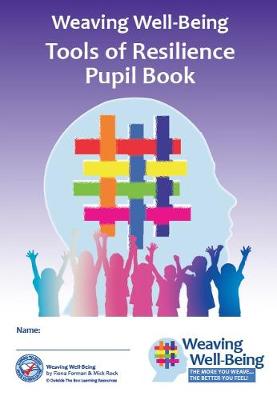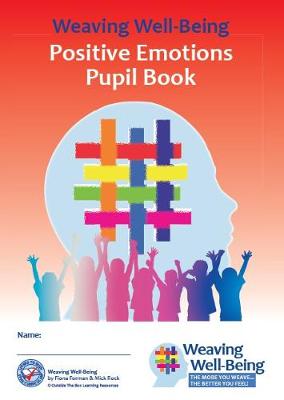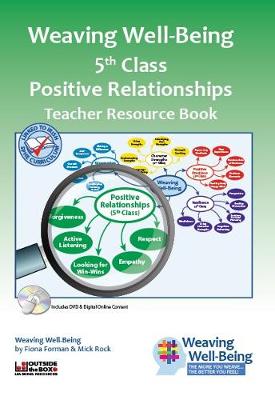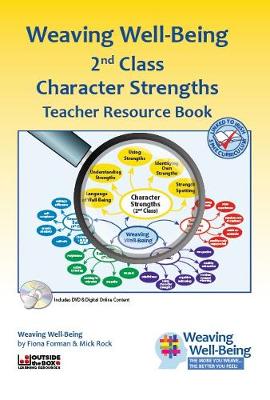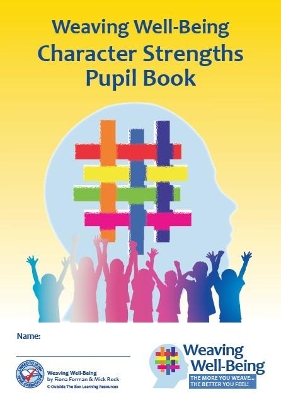Weaving Well-Being
8 total works
Weaving Well-Being (4th Class): Tools of Resilience - Teacher Resource Book
by Fiona Forman and Mick Rock
This Positive Education programme consists of 10 lessons for each class level and is grounded in evidence - based interventions from the field of Positive Psychology. Positive Psychology is the science of well-being.
It is underpinned by the concept that a state of well-being is not simply the absence of the negative, but the presence of the positive.
The Weaving Well-Being programme gives children the opportunity to weave positivity into their daily lives through a range of activities in a variety of areas.
The Tools of Resilience programme equips children with 6 practical evidence-based strategies for building resilience and coping with problems, anxieties and the many normal challenges of life.
Each lesson consists of a PowerPoint introduction, suggested development ideas, and specific activities in the children's activity book. There is also a homework page consisting of an activity to be carried out over the week at home and reported back on.
The children gradually build a highly personal portfolio of work reflecting the unique components which enhance their individual well-being and resilience.
A pull-out parent guide is included in the children's activity book to support parental involvement.
The lessons are designed to be implemented within the framework of the SPHE curriculum. Each lesson plan includes the relevant strands and strand units for ease of planning.
Weaving Well-Being (6th Class): Empowering Beliefs - Teacher Resource Book
by Fiona Forman and Mick Rock
This Positive Education programme consists of 10 lessons for each class level and is grounded in evidence-based interventions from the field of Positive Psychology. Positive Psychology is the science of well-being. It is underpinned by the concept that a state of well-being is not simply the absence of the negative, but the presence of the positive.
The Weaving Well-Being programme gives children the opportunity to weave positivity into their daily lives through a range of activities in a variety of areas. A growing body of research shows that positive emotions are linked to increased well-being.
This Empowering Beliefs programme consists of ten lessons which are designed to promote and cultivate positive beliefs about eight specific concepts.
Each lesson consists of a PowerPoint introduction, suggested development ideas and specific activities in the children's Activity Book. There is also a homework page consisting of an activity to be carried out over the week at home and reported back on.
The children gradually build a highly personal portfolio of work in their Activity Book, reflecting the unique components which enhance their individual well-being and resilience.
A pull-out parent guide is included in each child's Activity Book to support parental involvement.
The lessons are designed to be implemented within the framework of the SPHE curriculum. Each of the ten lesson plans include the relevant strands and strand units for ease of planning.
Weaving Well-Being (5th Class): Positive Relationships - Pupil Book
by Fiona Forman and Mick Rock
Each lesson gives children the opportunity to observe and record the effects of each strategy on their sense of well-being. The activity book builds into a highly personal portfolio which reflects the child's understanding and use of each strategy. Children also learn what well-being means and the importance of taking care of our well-being.
Weaving Well-Being (4th Class): Tools of Resilience - Pupil Book
by Fiona Forman and Mick Rock
Perspective
Healthy distraction
Thought disputation
Use of authentic character strengths
Mindfulness
Problem-focused planning
The children are also introduced to a mindfulness- base calming strategy to help them cope with anxiety, anger and other strong emotions. Each strategy has a specific `tool' which is represented by an image to help the children to understand and utilise the concepts involved. The Pupil Book gradually builds into a highly personal portfolio which reflects the child's use of each tool. Children also learn what well-being means and the importance of taking care of our well-being.
Weaving Well-Being (3rd Class): Positive Emotions - Pupil Book
by Fiona Forman and Mick Rock
Strategies:
Expressing gratitude
Understanding and experiencing 'Flow' activities
Performing acts of kindness
Noticing and savouring small positive events
Keeping fit and healthy.
Each lesson gives children the opportunity to observe and record the effects of each strategy on their sense of well-being. The Pupil Book builds into a highly personal portfolio which reflects the child's understanding and use of each strategy. Children also learn what well-being means and the importance of taking care of our well-being.
Weaving Well-Being (5th Class): Positive Relationships - Teacher Resource Book
by Fiona Forman and Mick Rock
This Positive Education programme consists of 10 lessons for each class level and is grounded in evidence-based interventions from the field of Positive Psychology. Positive Psychology is the science of well-being. It is underpinned by the concept that a state of well-being is not simply the absence of the negative, but the presence of the positive.
The Weaving Well-Being programme gives children the opportunity to weave positivity into their daily lives through a range of activities in a variety of areas. A growing body of research shows that positive emotions are linked to increased well-being.
This Positive Relationships programme equips children with eight practical evidence-based strategies, across ten lessons, to nurture positive relationships on a daily basis.
Each lesson consists of a PowerPoint introduction, suggested development ideas and specific activities in the children's Activity Book. There is also a homework page consisting of an activity to be carried out over the week at home and reported back on. The children gradually build a highly personal portfolio of work in their Activity Book, reflecting the unique components which enhance their individual well-being and resilience.
A pull-out parent guide is included in each child's Activity Book to support parental involvement. The lessons are designed to be implemented within the framework of the SPHE curriculum. Each of the ten lesson plans include the relevant strands and strand units for ease of planning.
Weaving Well-Being (2nd Class): Character Strengths - Teacher Resource Book
by Fiona Forman and Mick Rock
This book is aimed at 2nd Class (ages 7-8). This Positive Education programme consists of 10 lessons for each class level and is grounded in evidence-based interventions from the field of Positive Psychology, the science of well-being.
It is underpinned by the concept that a state of well-being is not simply the absence of the negative, but the presence of the positive. The Weaving Well-Being programme gives children the opportunity to weave positivity into their daily lives through a range of activities in a variety of areas.
The Character Strengths programme consists of ten lessons which are designed to give the children the opportunity to explore each of the 24 different Character Strengths and to help them identify their own top five strengths.
Each lesson consists of a PowerPoint introduction, suggested development ideas, and specific activities in th separate children's Pupil Book. There is also a homework page consisting of an activity to be carried out over the week at home and reported back on. The children gradually build a highly personal portfolio of work in their Pupil Book, reflecting the unique components which enhance their individual well-being and resilience. A parent guide is included to support parental involvement.
The lessons are designed to be implemented within the framework of the SPHE curriculum. Each of the ten lesson plans include the relevant strands and strand units for ease of planning.
